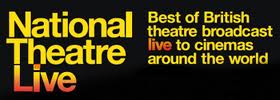Position 1: a stage production that is recorded, filmed or actually broadcast live ceases to be theatre. It may be considered television or film, but it is a record of theatre, not the thing itself. True theatre is experienced in the flesh, so to speak.
Position 2: for people who have no means to see any theatre, or a specific production, a recording or live transmission of the event, whether it occurs in a movie theatre or on a computer, is better than not seeing it at all, provided it is at least competently produced.
Position 3: even though it means I don’t get to see some things that really interest me, I don’t enjoy recorded theatre, no matter how artfully done, and I’m lucky enough to have access to lots of great theatre live, so after a few tries, I now don’t go. But that shouldn’t stop anyone else.
 Why have I laid out these positions so baldly, rather than making a case for them? Because I want to talk about an aspect of the growing appetite for cinecasts, NT Live, the home delivery Digital Theatre and the like that isn’t about the viewing experience at all. That’s a matter of opportunity and preference and I leave it to everyone else to hash out those issues. My interest in this trend is about how it is branding certain cultural events and producers – and how U.S. theatre is quickly losing ground.
Why have I laid out these positions so baldly, rather than making a case for them? Because I want to talk about an aspect of the growing appetite for cinecasts, NT Live, the home delivery Digital Theatre and the like that isn’t about the viewing experience at all. That’s a matter of opportunity and preference and I leave it to everyone else to hash out those issues. My interest in this trend is about how it is branding certain cultural events and producers – and how U.S. theatre is quickly losing ground.
In general, people attend commercial theatre based upon the appeal of a production – cast, creative team, author, reviews, word of mouth, etc. Who produced a show is pretty much irrelevant, and only theatre insiders can usually tell you who produced any given work. In institutional theatre, the producer has more impact, as people may attend because they have enjoyed a company’s work previously, because it conveys a certain level of quality. This is true in major cities and regionally, and while the name of the theatre alone isn’t sufficient for sales, it is a factor in a way it isn’t in the West End or on Broadway.
 As a result, what is happening with theatrecasts is that the reach of the companies utilizing this opportunity is vastly extended, and the brands of the companies travel far beyond those who sit in their seats or regularly read or hear about their work. There’s long been prestige attached to The Royal Shakespeare Company, the Metropolitan Opera and the National Theatre; now their presence in movie theatres has served to increase access and awareness. These longstanding brands are being burnished anew now that more people can actually see their work. The relatively young Shakespeare’s Globe, even as it makes its Broadway debut, is also gaining recognition thanks to recordings of their shows.
As a result, what is happening with theatrecasts is that the reach of the companies utilizing this opportunity is vastly extended, and the brands of the companies travel far beyond those who sit in their seats or regularly read or hear about their work. There’s long been prestige attached to The Royal Shakespeare Company, the Metropolitan Opera and the National Theatre; now their presence in movie theatres has served to increase access and awareness. These longstanding brands are being burnished anew now that more people can actually see their work. The relatively young Shakespeare’s Globe, even as it makes its Broadway debut, is also gaining recognition thanks to recordings of their shows.
It should be noted that for UK companies, “live” is a misnomer when it comes to North American showings. We’re always seeing the work after the fact, given the time difference, so in many ways it’s no different than a pre-recorded stage work on PBS. But the connotation of live is a valuable imprimatur, and few seem to mind it, even when there are “encore” presentations of shows from prior years. The scale of a movie screen, the quality of a cinema sound system appear to be the true lure, along with the fact that these are not extended engagements, but carefully limited opportunities that don’t compete with actual movie releases.
Regretfully, by and large, American theatre (and theatres) are missing the boat on this great opportunity for exposure, for revenue, for branding. There have been the occasional cinecasts (Memphis The Musical; Roundabout’s Importance of Being Earnest, imported from Canada’s Stratford Festival) but they’re few and far between. We’re about to get a live national television broadcast of the stage version of The Sound of Music, but it’s an original production for television, not a stage work being shared beyond its geographic limitations. Long gone are the days when Joseph Papp productions of Much Ado About Nothing and Sticks And Bones were seen in primetime on CBS; when Bernard Pomerance’s The Elephant Man was produced for ABC with much of the original Broadway cast; when Nicholas Nickleby ran in its entirety on broadcast TV; when PBS produced Theatre in America, showcasing regional productions, when Richard Burton’s Hamlet was filmed on Broadway for movie theatre showings 50 years ago.
Most often, when this topic comes up in conversations I’ve been party to, there’s grumbling about prohibitive union costs as a roadblock. Perhaps the costs have changed since the days of many of the examples I just cited, yet somehow Memphis and Earnest surmounted them. Even as someone who doesn’t particularly care to see these recorded stage works, I worry that American theatre is lagging our British counterparts in showcasing work nationally and internationally, in taking advantage of technology to advance the awareness of our many achievements. Seeing an NT Live screening has become an event unto itself – this week the National’s Frankenstein is back just in time for Halloween; the enthusiasm last week for the cinecast of Merrily We Roll Along (from the West End by way of the Menier Chocolate Factory) was significant, at least according to my Twitter and Facebook feeds. The appetite is also attested to by an online poll from The Telegraph in London, with 90% of respondents favoring theatre at the movies (concurrent with an article about the successful British efforts in this area). I’d like to see this same enthusiasm used not just to bring U.S. theatre overseas, but to bring Los Angeles theatre to Chicago, Philadelphia theatre to San Francisco, Seattle theatre to New York, and so on – and not just when a show is deemed commercially viable for a Broadway transfer or national tour.
I’m not trying to position this as a competition, because I think there’s room for theatre to travel in all directions, both at home and abroad. But without viable and consistent American participation in the burgeoning world of theatre on screen, we run the risk of failing to build both individual brands and our national theatre brand, of having our work diminished as other theatre proliferates in our backyards, while ours remains contained within the same four walls that have always been its boundaries and its limitations. Somebody needs to start removing the obstacles, or we’re going to be left behind.





